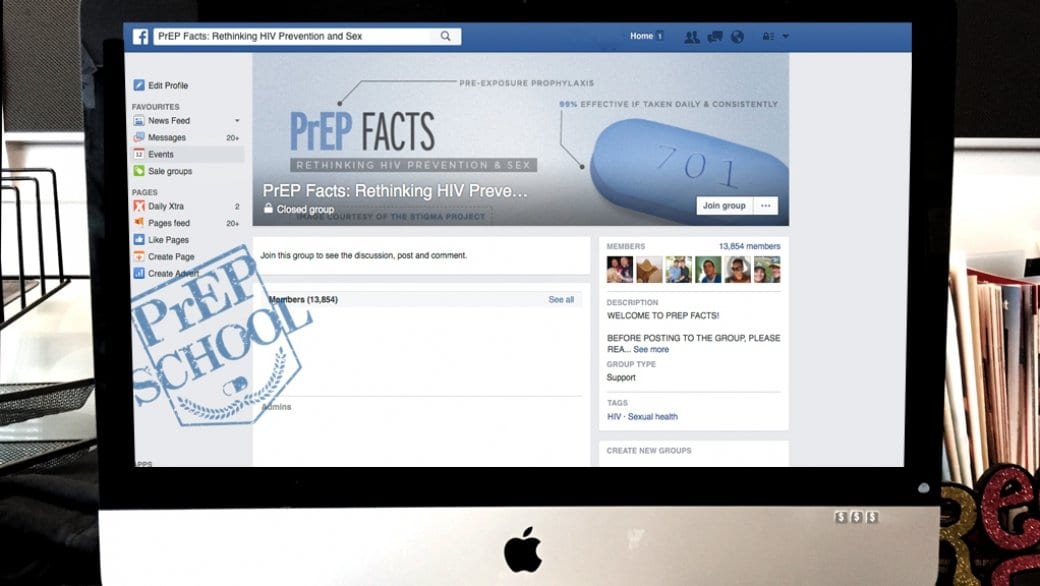Facebook can often feel like a huge waste of time, but could it actually be a useful tool for LGBT people? According to PrEP educator and marriage and family therapist Damon Jacobs, it is. He started the PrEP Facts: Rethinking HIV Prevention and Sex Facebook group on July 1, 2013, in an effort to educate others about PrEP. Since then, him and the group have been mentioned in Out, New York Magazine and The New York Times. There are now 14,182 worldwide members and counting, creating a supportive network that provides reliable research data, documents and articles about PrEP. It has successfully created a supportive and safe repository of information — all on a platform that many think of as a waste of time.
“I think the Facebook group and social media in general has really played a crucial role in people learning about PrEP because they’re not learning it from their doctors. And they’re not learning it from their therapists or their nurses or their communities — I think that’s changing now,” Jacobs explains.
Between 2009 and 2013, Jacobs was working in New York City doing outreach for the HVTN 505 study, which was a Phase IIb exploratory clinical trial for an HIV vaccine regimen. He’d go to bars and clubs, and even walk New York and Brooklyn in the middle of the night, to talk to people about safer sex. It was an attempt to educate and inspire folks to be a part of the trials.
“What I was finding was that people were not learning about PrEP. That people were not learning about Truvada, and the more and more I was having these conversations, especially with younger men of colour, the more I was hearing people say, ‘Oh, sorry, just tested positive. Can’t help you out. Sorry. Good luck on the vaccine. I hope we have it some day but it’s too late for me.’ And these conversations would happen with fair regularity,” Jacobs says.
“But my job wasn’t to talk about PrEP. My job was to talk about vaccines and I started getting frustrated because nobody was getting the word out to these young men and sometimes I would even ask them: ‘I’m just wondering, did you ever hear about PrEP? Did your doctor ever tell you about PrEP?’” he says.
“They had no idea there was a pill that could’ve kept them negative because nobody would share this information in New York City back then.”
During July 2011, Jacobs himself started using PrEP after learning about the iPrex study results through his work. The study stated that those who adhered to taking PrEP daily would be protected from HIV by 99 percent. The FDA then approved Truvada as PrEP in the US on July 16, 2012.
The HIV vaccine trials ended in the middle of 2013 because there was zero efficacy — funding ceased and Jacobs was let go. But he was still meeting young men who were seroconverting. Without any money behind him or any sort of power, he started the Facebook page with the hopes of raising awareness and educating gay and bisexual men. This method was a no brainer for Jacobs: “I’ve got Facebook, and I know how to use Facebook — and I’m kind of obsessed with Facebook anyway — so I might as well use it for something positive,” he explains. “It really was a reaction to the fact that at the time in New York City there was no information available to these young men who were most at risk for contracting HIV.”
Good news is, PrEP education has come a long way since then and there have been some serious improvements, particularly in bigger cities. “People are now aware that this thing exists,” explains Dr Darrell Tan. Tan is an infectious disease physician, clinician-scientist and Canadian Institute of Health Research new investigator, whose research focuses on clinical trials in HIV prevention and HIV/STI co-infection.
“We’ve actually been able to measure that in some studies that we’ve done as well, was that rate of people who have heard of PrEP when we do cross-sectional surveys has dramatically increased over the last five years in Toronto, for example. And that’s been a purely grassroots effort. It has not been a top-down effort.” Dr. Tan attributes this “grassroots” effort to things like social media, hook-up apps, word of mouth and the LGBT press.
Although Facebook hasn’t been the only method to educate gay men about PrEP, it’s been a significant force. “It’s a tool we didn’t have 10 years ago,” Jacobs says. “When people tell me, I learned about PrEP because of this group, or I knew what to ask my doctor because of this group or I knew how to communicate this to my friends because of this group, I’m like, woah! Social media really can have an impact.”
In this instance, Facebook is far from frivolous, serving and informing our community. With such progress, many high risk gay and bisexual men are now protected but we still have a long way to go. “I think the part that is not answered yet is how do you get providers to know?” Tan says.
Next: Who is PrEP for, anyway?>
Editor’s note, May 25, 2016: The headline on this column has been changed from an earlier version, “Facebook is the best tool for learning about PrEP.”

 Why you can trust Xtra
Why you can trust Xtra


